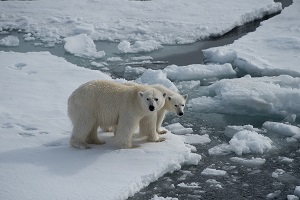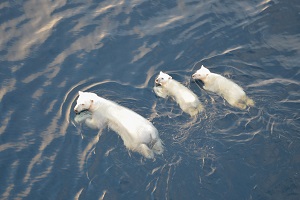Rosneft Supports Moscow Zoo’s New Educational Programme about Polar Bear

With the support of Rosneft Oil Company, Moscow Zoo is launching a sociocultural educational project for primary school pupils about the polar bear, a living symbol of the Arctic.
The interactive format of the Polar Bear in Nature and in Captivity programme will teach children many amazing facts about polar bears and even help them design a model of an enclosure for them. Children will participate in a cryogenic experiment, where the classroom will get filled with Arctic fog, icebergs will grow on the desks, and the floor will turn to ice.  Zoo experts will help foster in children an understanding of ecological dependencies and the importance of caring for polar bears and other species.
Zoo experts will help foster in children an understanding of ecological dependencies and the importance of caring for polar bears and other species.
The course has been developed for grades 1 through 5 under the guidance of teachers, psychologists, and biologists. More than 4,000 schoolchildren, including those from children’s homes, will join the project.
Rosneft considers the preservation and protection of polar bears as one of its priorities in the field of environmental protection. Since 2013, all polar bears in all Russian zoos are in the custody of the Company to be provided with adequate nutrition, veterinary service and improved living conditions.  Rosneft helped to develop, for the first time in Russia, special toys to encourage polar bears to be more physically active. Several types of toys are made of particularly durable plastic and sent to all member zoos yearly.
Rosneft helped to develop, for the first time in Russia, special toys to encourage polar bears to be more physically active. Several types of toys are made of particularly durable plastic and sent to all member zoos yearly.
Rosneft is also implementing a comprehensive programme to study polar bears in the wild. The results of numerous expeditions help to significantly expand and update data on these animals, which are a symbol of the Arctic and the only large predator in the area, as well as to develop measures to protect their populations.
Note for Editors:
The polar bear is one of the key species--indicators of the condition of Arctic ecosystems, standing at the top of the food chain.
Scientists estimate the number of polar bears to be between 22,000 and 31,000. A large part of the species’ range is located in the Russian part of the Arctic. The special conservation status of the polar bear has force throughout the entire range—they are included in the Red Book of the Russian Federation and in the Red List of the International Union for Conservation of Nature and Natural Resources.
Rosneft
Information Division
September 1, 2022